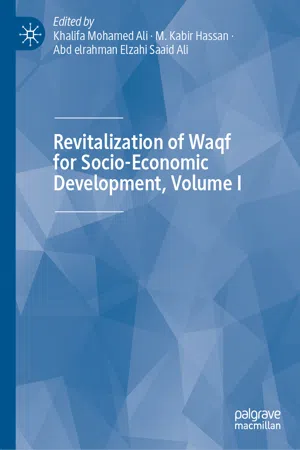The two volumes on waqf result from a workshop on the “Revival of Waqf for Socio-Economic Development,” jointly organized by the Islamic Research and Training Institute (IRTI) of the Islamic Development Bank (IBD) Group, Islami Bank Bangladesh Limited (IBBL), and the Center for Zakat Management (CZM), in Dhaka, Bangladesh during November 4–5, 2017.
Socio-economic development, as the name suggests, consists of two dimensions: social and economic. The social development aspect signifies a transition from the traditional way of living to a modern and more progressive one. The primary concern of social development is to invest in people by providing inclusive access to education, health, and other social welfare programs. Thus, the people’s development is wholly achievable through social justice. There are many competing definitions of social development. Nobel Laureate Amartya Sen sees social development as the creation of social opportunities for all. Social development includes economic development and encompasses all aspects of collective development in society in broader perspective and human welfare through improving the quality of life and sharing cultural and material goods equally.
The other dimension, economic development, is one of the most frequently used terminologies of the last two centuries. Very often economic growth is wrongly equated with economic development. According to Amartya Sen, economic development is, conceptually, broader than economic growth. It discusses how to develop the economic wealth of a community, region, or country for the citizen’s well-being. A community’s economic welfare and living standard can be significantly enhanced through various economic policies such as job creation, income generation, and redistribution through tax and other means.
Socio-economic development consists of a society inclusively and progressively improving its standard of living and quality of life. It relates to the sustainable well-being of all members of a society through increasing the stocks of physical as well as human capital (IGI global, Web site). Hence, any program that ensures people get access to the economy sustainably can be considered socio-economic development (sociology index, Web site). The literature of development economics abounds with examples of important factors of socio-economic development, among them education, health, gender parity, employment creation, preventing dowries and child marriage, income equality, etc.
Socio-economic development in the Islamic perspective, according to Mandal (2000), can be defined as “a process leading to a substantial and sustainable enhancement of the material and spiritual welfare of the Muslim population in the world.” Gauging socio-economic development by statistics such as GNP growth or purchasing power is ultimately fruitless unless an equitable distribution of the income and wealth derived from an equitable ownership of the wealth of Allah is ensured. Hence, ecological and environmental balance must be maintained, and the government of a Muslim state must be competent enough to act as true agents of Allah. This means that the safety and security of life and property must be ensured and the basic needs for people’s material prosperity must be fulfilled without placing barriers on their spiritual prosperity.
Mandal (2000) identifies nine objectives of socio-economic development from an Islamic perspective as follows: (1) Tawhid or the Oneness of Allah must be promoted; (2) material opulence and welfare are considered a mere intermediate objective, helpful to achieve the ultimate goal—maximization of spiritual prosperity and welfare; (3) balance between the material and spiritual spheres must be maintained while optimizing welfare; (4) the state should enforce regular prayers and compulsory charity and encourage voluntary sharing of wealth and income; (5) activities that upset ecological and environmental balance must be avoided; (6) peace and harmony at the interregional and international levels must be maintained; (7) the institution of brotherhood; (8) the promotion of faith, keeping in mind the reality of Doomsday and the Resurrection; and (9) appointments of nations to run world affairs on a fixed term basis.
Iqbal (2005) summarizes the Islamic perspective on distributive justice in three compelling goals: firstly, the guaranteed fulfillment of the basic needs of everyone; secondly, the establishment of personal income equity; and thirdly, the removal of any form of extreme inequalities of wealth and income. Quranic texts and the hadiths of the Prophet (PBUH), juristic agreement, and examples set by the Caliphs clearly endorse the guarantee of people’s basic needs.
The United Nations’ paradigm shift to Sustainable Development Goals (SDGs) paves the way for Islamic finance to excel because its models focus on societal well-being and environmental protections through Maqasid al Shariah realization. The models of Islamic banking and finance have been linked with the institutional and welfare concept of sustainability aimed at providing for the long-term solvency of financial institutions as well as the well-being of society. Islamic social finance—waqf, zakat, microfinance—is an ideal channel for the socio-economic development of the masses. The waqf-based financial activities in various Muslim countries across the world have huge potential to play quite a significant role in expediting welfare and development initiatives. It is time to revitalize the classical concept of waqf by discovering new tools and techniques to make possible those welfare activities aimed at covering a wider horizon and improving the socio-economic conditions of the impoverished segment of society. An all-embracing awareness program is a must to persuade the rich to voluntarily come forward in joining welfare programs through establishing various waqf-oriented financial enterprises.
In light of the above aspirations, the workshop aimed at exploring waqf regulation in IDB member countries, its modernization and relationship to Shariah, understanding the strategies and models to promote waqf related activities for greater socio-economic development, enhancing good governance practices through the formulation of policies for waqf projects, and understanding the confluence of waqf, zakat,...
